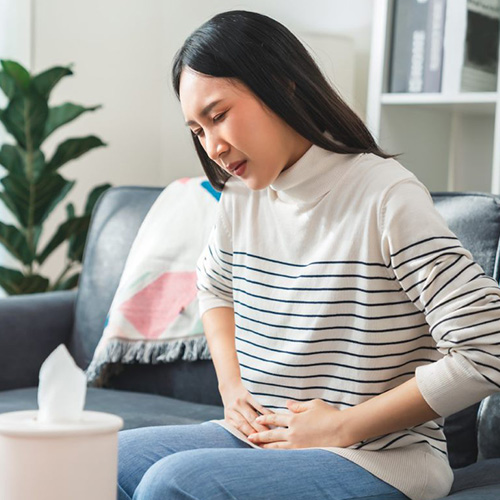If you’re a woman of reproductive age, chances are you’ve had to deal with premenstrual syndrome (PMS) at one time or another or even every month. PMS strikes around a week or so before your monthly period starts and can include any or all of the following symptoms: changes in appetite, weight gain, abdominal pain, back pain, headache, breast swelling and tenderness, nausea, constipation, anxiety, irritability, anger, fatigue, restlessness, mood swings and crying.
Statistics show that almost half of women who are of childbearing age experience PMS, and for about 20% of those women the symptoms can be severe enough to interfere with their daily routines. If you’ve been struggling with PMS and want to know how you can address this health issue, keep on reading.
Why Do Women Get PMS?
Here are two of the potential reasons why women struggle with PMS each month:
- Hormonal fluctuations of estrogen and progesterone: These hormones work in tandem to ensure that your reproductive system is in good health. They both prepare your body for pregnancy, but their levels fluctuate throughout your cycle. After ovulation, the fluctuations in estrogen levels affect mood. Meanwhile, progesterone rises for 2 weeks after ovulation but if pregnancy doesn’t happen then its levels drop. The drop in progesterone can interfere with your sleep and cause insomnia. These changes in estrogen and progesterone levels also influence a neurotransmitter called serotonin.
- Changes in serotonin levels: This neurotransmitter plays a big role in managing your mood, sleep, appetite, and the motility of your intestinal tract. When there’s insufficient levels of serotonin in the body, you may be prone to PMS symptoms like feelings of depression, fatigue, and appetite and sleep issues.
A formal PMS diagnosis is made when your symptoms fulfill the following criteria:
- Occur in the five days before menstruation for at least three consecutive menstrual cycles
- Disappear within four days after the period starts
- Interfere with some daily activities
How Can You Relieve PMS?
There are many potential ways to address PMS symptoms. Here are some tips you can keep in mind:
- Manage your stress: Because some PMS symptoms can cause a great deal of stress, it’s crucial that you practice techniques that’ll help you relieve these feelings. Yoga, meditation, tai chi, journaling, or talking to a friend may aid in lowering your stress levels.
- Sneak in some exercise: These will help boost your mood and alleviate some PMS symptoms. Good choices for exercises include light walking, light cardio, or low-volume strength training, although you can also ask your doctor or a physical trainer for other ideas.
- Watch what you eat: Some studies have shown an association between sweet foods, fast foods, junk food and coffee, and PMS. Avoiding these foods can help lessen your chance of suffering from PMS. Avoid too much salty foods as well, to help lessen bloating. Try to reduce your meal portions to a smaller size and consume them more frequently across different times of the day. Eat a lot of fruits, vegetables, and whole grains, and include potassium- and calcium-rich food into your meals. Remember to drink lots of water too.
- Get enough sleep: Make sure you get at least seven to eight hours of high-quality sleep so your body feels well-rested and is able to combat PMS symptoms.
- Take note of PMS symptoms: Ideally, make an effort to record symptoms for two to three menstrual cycles. This may help you understand what your body is going through and aid your doctor in analyzing your body’s changes.
- Ask your doctor about medicines: Ibuprofen, acetaminophen, paracetamol, or non-steroidal anti-inflammatory drugs (NSAIDs) may be useful in relieving symptoms like cramps and/or headaches. If you notice bloating or breast soreness, you may ask about taking diuretics too.
- Consider natural supplements: Another good option are natural supplements or oils which reduces symptoms of PMS including hormonal acne and breast tenderness.
If symptoms persist or become too painful, consult your OB-Gyne or a health professional immediately. It’s possible that you may be dealing with a more serious health issue called premenstrual dysphoric disorder (PMDD). Women with PMDD experience the usual PMS symptoms, but they struggle with more intense emotional symptoms like irritability, anxiety, or depression, which can be detrimental in the long run.
References:
https://www.ncbi.nlm.nih.gov/books/NBK560698/
https://www.nhs.uk/conditions/pre-menstrual-syndrome/
https://www.mayoclinic.org/diseases-conditions/premenstrual-syndrome/symptoms-causes/syc-20376780
https://my.clevelandclinic.org/health/articles/9132-premenstrual-dysphoric-disorder-pmdd
https://www.medicalnewstoday.com/articles/325314#what-is-pms
https://www.medicalnewstoday.com/articles/277177#function
https://www.acog.org/womens-health/faqs/premenstrual-syndrome
https://www.healthline.com/health/progesterone-function
https://www.healthline.com/health/pms-depression#why-it-happens https://www.healthline.com/health/exercise-during-period#best-exercises








